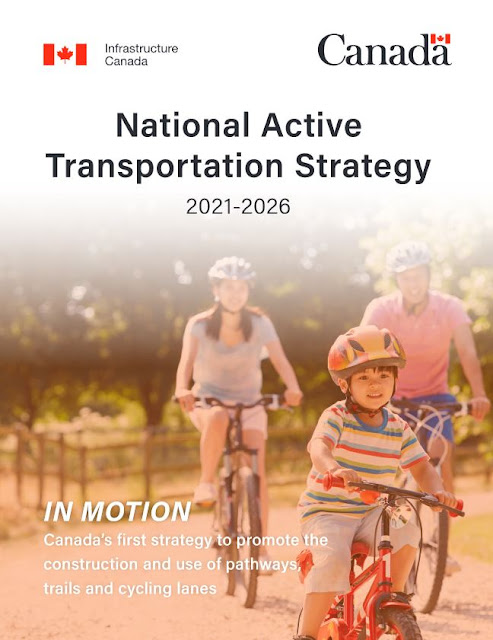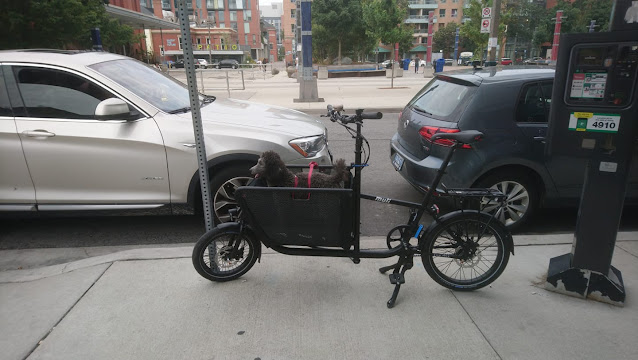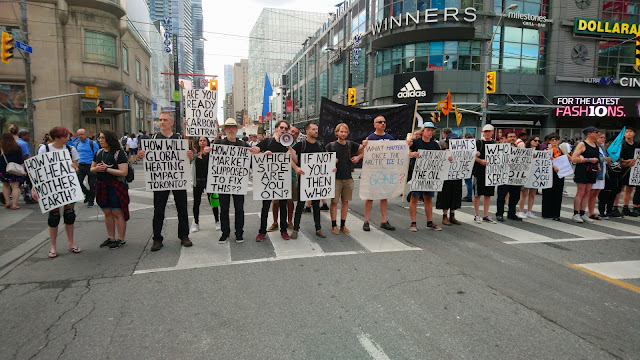Yesterday, Prime Minister Justin Trudeau confirmed what was long suspected. Canadians will go to the polls on Monday, September 20 at a time when a high number of eligible Canadians have gotten vaccinated, but a fourth COVID-19 wave is emerging thanks to the delta variant. Let’s look at what Canada’s political parties & candidates need to do to win the hearts & minds of those who walk or bike.
 |
| You can read Canada's active transportation strategy (cover photo above) at this link |
Active Transportation Strategy and Fund
In a huge nod to the efforts of Vélo Canada Bikes, the Trudeau government announced Canada’s first active transportation strategy earlier this year along with a $400 million fund to be spent over five years. On a per capita basis, it works out to more than $2 per year. Sure it pales in comparison to the Netherlands which spent €30 per capita (almost $50 Canadian) annually, but it is a step in the right direction. Going forward, there needs to be a push to make the fund permanent and expanded; as well as call on the provinces to introduce their own programs (or reinstate previously scrapped ones in Ontario’s case).
Mandatory Truck Sideguards
For almost twenty years, there have been calls for Transport Canada to make sideguards mandatory for heavy trucks. These sideguards have been proven to significantly reduce the chances of people walking or biking from being caught under such trucks. Unfortunately, Transport Canada still hasn’t implemented this life saving change; likely because of only 22% of collisions between drivers of heavy trucks and vulnerable road users happen on the side per the “Safety Measures for Cyclists and Pedestrians around Heavy Vehicles” report. The same report also noted fatalities and serious injuries decreased by only 6% and 13% (respectively) in both the United Kingdom and the European Union when they introduced side guard legislation. Even so, truck sideguards need to become part of the active transportation strategy as soon as possible.
Safe Rail (and Highway) Crossings
Another safety action which falls under federal jurisdiction is providing safe rail crossings to minimize instances of trespassing when such crossings are too far apart. Former NDP MP Hélène Laverdière introduced Bill C-322 in 2017 in response to the persistent refusal by rail companies such as Canadian Pacific to implement them in her home city of Montréal. Unfortunately, the Liberals and Conservatives defeated this bill. Such a bill needs to be reintroduced as soon as possible which should be strengthened to include safe highway crossings in collaboration with the provinces. Rail lines and highways both present significant barriers for cities to establish fully connected active transportation networks.
Dangers of More (and Larger) Pickup Trucks
One disturbing trend on North American roads is the increased sales of SUV’s and pickup trucks, while the vehicles themselves have gotten bigger and heavier. These trucks not only have considerably larger front blind areas, but they are also more likely to kill vulnerable road users than smaller cars travelling at the same speed with the larger grilles striking vital organs as opposed to hitting the lower legs as passenger cars do. These observations have prompted calls to ban the sale of pickup trucks.
While reasonable exceptions should be made for those who legitimately need pickup trucks for work – especially farmers and contractors – most of the pickups are being bought by those who don’t need them. Many such trucks have four doors and shorter beds which are not intended for work and 75% of them haul stuff only once a year (or never). The federal government needs to intervene to discourage consumer pickup truck purchases; instead suggesting they rent for those few times they need such hauling and/or towing capabilities. If not an outright ban, they should be subject to significant additional taxes while cities should be encouraged to implement congestion charges for such larger vehicles.
Rebates for E-Bikes (and E-Cargo Bikes)
 |
| Electric assist versions of these cargo bikes could benefit from government rebates |
One pedal-powered vehicle which has the potential to become an urban car replacement is the electric assist cargo bike. Something I have seen first hand when I rented a Larry vs Harry Bullitt last month (and more recently bought a Muli Muskel cargo bike without e-assist. However, e-assist cargo bikes usually cost at least $7,000 Canadian with prices exceeding $10,000 not being uncommon which can present a significant barrier. In some countries such as France, they introduced a trade in program this year in which people can get €2,500 when trading in a car for an e-bike. Some provinces such as British Columbia offer e-bike subsidies while others such as Ontario attempted to make many such e-bikes illegal with Bill 282. To encourage a reduction in private vehicle use, the federal government ought to provide a national e-bike rebate program, as well as provide consistent rules across provinces that don’t discourage their use.
Climate Emergency
 |
| Extinction Rebellion protesters blocking the Yonge and Dundas intersection in July 2019 |
Last, but certainly the most important, is the need for all three levels of government to treat the climate emergency for what it is and act urgently. Especially with communities such as Lytton, BC which broke temperature records and burned to the ground days later. While building more public transit and active transportation infrastructure is a must, we must also put an end to all fossil fuel subsidies and pipeline expansion projects such as Trans Mountain. We must ensure a tax on the rich gets implemented to ensure green projects are fully funded and built, while a just transition is implemented for oil and gas workers. There are also calls for a universal basic income and increased affordable housing; the latter of which is critical to encourage people to remain within communities accessible by foot, bike, or transit.
To The Polls
Delivering election signs by cargo bike
Regardless of political affiliation, it is critical we make climate change THE top priority for the upcoming federal election. As COVID-19 has shown us, we simply cannot go back to “normal” in which income inequality grows, streets remain dangerous for vulnerable road users, and climate change worsens. Let’s call on all political candidates to take road safety and the climate emergency seriously, as well as get out and vote on September 20.

No comments:
Post a Comment